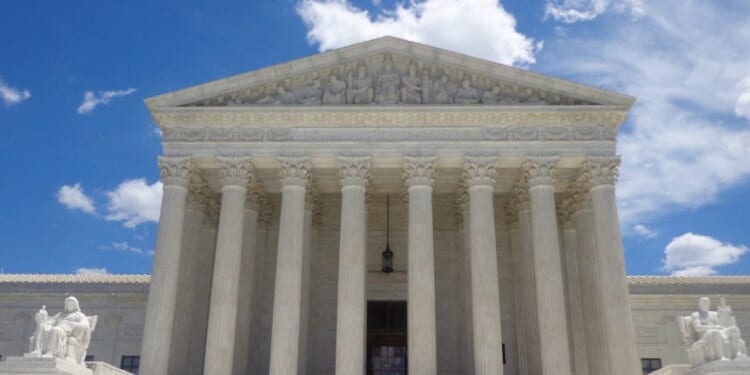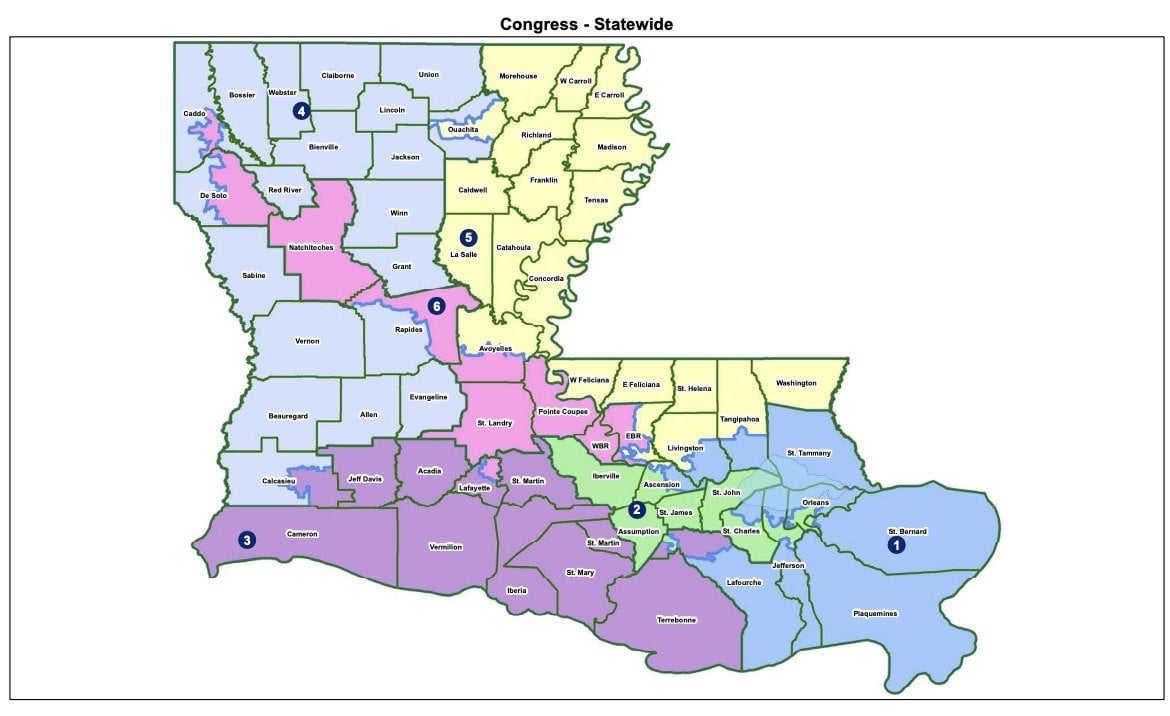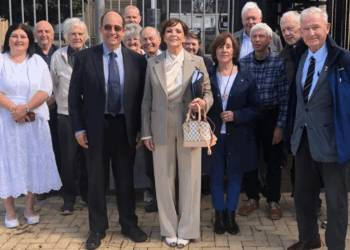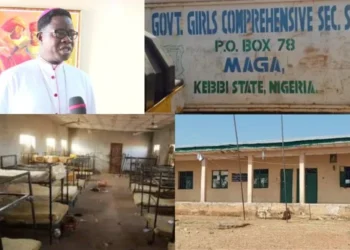The Supreme Court will hear arguments on Wednesday in a case that could end the use of race to draw congressional districts.
Louisiana’s congressional map is caught at the center of a protracted legal fight that highlights the “conflicting demands” of Section 2 of the Voting Rights Act, which prohibits election practices that result in “denial or abridgement” of citizens to vote based on race, and the 14th Amendment’s Equal Protection Clause.
“Race-based redistricting under Section 2 is principally unconstitutional because it inherently rests on a racial stereotype: that all voters of a particular race must—by virtue of their membership in their racial class—think alike, share the same interests, and prefer the same political candidates,” the state argued in a court filing. “That racial stereotype is squarely at odds with this Court’s precedent.”
Louisiana’s case already came before the court last term, but the justices postponed a decision, rescheduling the case for a second round of oral arguments. In August, they asked the parties to file briefs on whether the “intentional creation of a second majority-minority congressional district violates the Fourteenth or Fifteenth Amendments to the U. S. Constitution.”
Louisiana congressional map with second majority-black district in pink. (Credit: Screenshot/ SB8 by Louisiana State Sen. Glen Womack)
Litigation over the state’s map began in 2022 with a challenge by a group of black voters, who objected to the inclusion of only one majority-black district. Forced by court order to go back to the drawing board, the legislature passed a new map in January 2024 that made District 6 a second majority-black district.
A group of “non-African American” voters promptly sued over the 2024 map, claiming it was an unconstitutional racial gerrymander. A three-judge panel agreed, finding the new map unlawfully made race the “predominant factor” in its creation.
Republican State Sen. Glen Womack, who drafted the 2024 version, argued at the time that “politics drove this map,” not race. He wanted to protect prominent members from Louisiana like House Speaker Mike Johnson, House Majority Leader Steve Scalise and Republican Rep. Julia Letlow, according to the Louisiana Illuminator.
“The amount of time, money, and resources Louisiana has dedicated to whether it sufficiently discriminated against black and white voters is astronomical,” the state wrote in its August brief. “And to what end? Unless something changes, the entire cycle will repeat itself after the 2030 Census.”
Race-based voting harms voters, states and the judiciary, forcing courts to “pick winners and losers based on race” and effectively making the state’s map a “recommendation” to be approved by an Article III judge, Louisiana argued in its brief. Ultimately, these harms strike “directly at the very stature of our Nation.”
“Our dedication to equal justice under law is one of the proudest boasts of our democracy,” the state wrote. “No matter how fervent our dedication, however, it will forever ring hollow so long as our governments mandate racial discrimination against their citizens and so long as our courts demand that discrimination.”
The Department of Justice (DOJ) argued in a brief supporting Louisiana that race-based redistricting efforts under Section 2 are the “consequence of misguided applications of the vague framework for vote-dilution claims” outlined in the Supreme Court’s 1986 Thornburg v. Gingles decision.
To prove a vote dilution claim, the Supreme Court in Gingles outlined a three-part test: a minority group must show it is “sufficiently large and geographically compact to constitute a majority in a single-member district,” politically cohesive and that the “white majority votes sufficiently as a bloc” that could defeat the minority’s preferred candidate.
“Too often, Section 2 is deployed as a form of electoral race-based affirmative action to undo a State’s constitutional pursuit of political ends,” the DOJ argued. “That misuse of Section 2 is unconstitutional.”
Louisiana’s Secretary of State asked the court to “rule as soon as possible—ideally in December or early January.” Primary elections are scheduled for April 18, 2026, with qualifying dates in January.
Justice Clarence Thomas wrote in June that the court has an “obligation to resolve such challenges promptly,” dissenting from the court’s decision to rehear Louisiana’s case.
“These cases put the Court to a choice: It may permit patent racial gerrymandering under the auspices of §2 compliance, or it may admit that, as the Court has construed the statute, a violation of §2 is insufficient to justify a race based remedy,” Thomas wrote. “That decision should be straightforward.”
In its 2023 Allen v. Milligan ruling, the Supreme Court found 5-4 that Alabama’s congressional map likely violated the Voting Rights Act. While Justice Brett Kavanaugh joined the majority, he referenced an argument raised by Thomas that the “authority to conduct race-based redistricting cannot extend indefinitely into the future.”
Roberts, who authored the landmark 2023 Students for Fair Admissions v. Harvard decision overturning racial preferences in college admissions, joined the Milligan majority, though he has expressed strong opposition to race-based practices.
“It is a sordid business, this divvying us up by race,” Roberts wrote in a 2006 partial dissent for a redistricting case.
All republished articles must include our logo, our reporter’s byline and their DCNF affiliation. For any questions about our guidelines or partnering with us, please contact [email protected].
DONATE TO BIZPAC REVIEW
Please help us! If you are fed up with letting radical big tech execs, phony fact-checkers, tyrannical liberals and a lying mainstream media have unprecedented power over your news please consider making a donation to BPR to help us fight them. Now is the time. Truth has never been more critical!
Success! Thank you for donating. Please share BPR content to help combat the lies.
We have no tolerance for comments containing violence, racism, profanity, vulgarity, doxing, or discourteous behavior. Thank you for partnering with us to maintain fruitful conversation.









![Florida Officer Shot Twice in the Face During Service Call; Suspect Killed [WATCH]](https://www.right2024.com/wp-content/uploads/2025/12/Inmate-Escapes-Atlanta-Hospital-After-Suicide-Attempt-Steals-SUV-Handgun-350x250.jpg)








